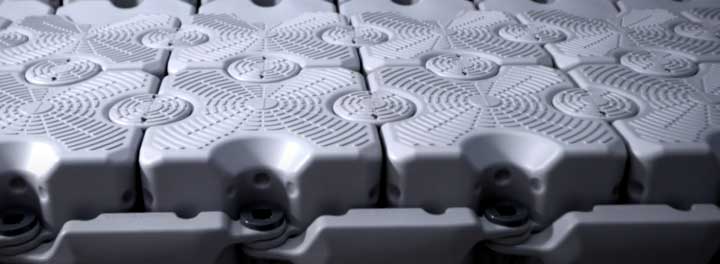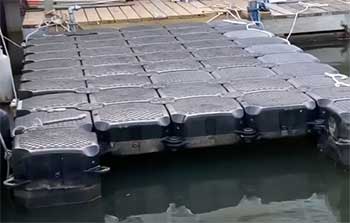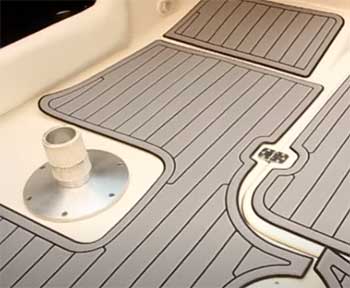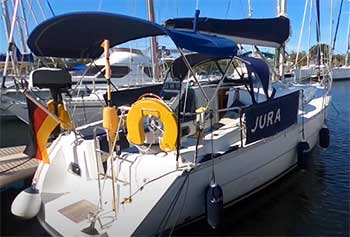When it comes to ensuring your boat’s safety and security, the choice of a dock system is critical. Among the numerous dock systems available today, Dock Blocks and Jet Dock are arguably two of the most popular choices. But which one offers more value to boat owners?
In this article, we’ll compare Dock Blocks and Jet Dock, analyzing their key features, pros, cons, and more. Our goal is to provide a unique and comprehensive overview that helps you decide which system suits your needs best.
A Brief Comparison Table
Here’s a comparative breakdown of the key features, pros, and cons of Dock Blocks and Jet Dock.
| Feature | Dock Blocks | Jet Dock |
| Design & Assembly | Simple and easy | Sophisticated and complex |
| Adaptability to Water Conditions | Less adaptive | Highly adaptive |
| Safety | Can be slippery when wet | Self-draining design |
| Price | More affordable | More expensive |
| Material | High-Density Polyethylene (HDPE) | Multiple materials |
| Versatility | Less versatile | Highly versatile |
| Maintenance | Low | Moderate |
| Environmental Impact | Low (No chemicals leaching) | Low (Floats on water surface) |
| Ideal for | Lakes that freeze, DIY enthusiasts | Fluctuating water levels, various watercraft types |
Dock Blocks: High-Quality, Modular, and Durable

Dock Blocks offers a modular system characterized by high-quality plastic blocks that snap together effortlessly. The modular design allows boat owners to easily configure and customize their dock layout according to their needs.
- Pros of Dock Blocks
Dock Blocks shine in their ease of assembly. Each block connects to the next like Lego bricks, a feature that simplifies installation and customization. No special tools or technical know-how are required.
In addition, the durability of Dock Blocks is unmatched. Made from high-density polyethylene (HDPE), these docks can withstand harsh weather conditions, including freezing temperatures. This makes them an excellent choice for lake docks in colder regions.
Dock Blocks are also environmentally friendly. They do not leach chemicals into the water, ensuring the preservation of aquatic life.
- Cons of Dock Blocks
While Dock Blocks are lauded for their durability and ease of assembly, they do have a few shortcomings. For one, they are not ideal for fluctuating water levels. Their fixed height makes them less adaptive to changes in water depth.
Moreover, despite being durable, the HDPE material can become slick when wet, which may pose a safety risk.
Jet Dock: Advanced, Versatile, and Adaptable
Jet Dock, on the other hand, is a floating dock system known for its advanced design and adaptability. This dock system offers a versatile platform that accommodates a wide range of watercraft, from boats to jet skis.
- Pros of Jet Dock
Jet Dock’s greatest advantage is its versatility. These docks can handle a variety of vessels and are an excellent option for boat owners with different watercraft types.

Another noteworthy feature is their adaptability to fluctuating water levels.
Jet Dock’s floating system remains stable and secure regardless of water depth changes, making it ideal for regions with tidal variations or fluctuating lake levels.
Jet Dock is also known for its self-draining feature.
The dock’s design ensures that water does not collect on the surface, enhancing safety and reducing maintenance.
- Cons of Jet Dock
Despite the advanced features, Jet Dock has its limitations. Its sophisticated design and multiple components make installation more complex than the Dock Blocks system.
Also, Jet Dock systems tend to be more expensive than other docking options. The advanced features and durability come with a higher price tag, making it less accessible to some boat owners.
Key Differences Between Dock Blocks and Jet Dock
Understanding the key differences between Dock Blocks and Jet Dock will enable you to make a more informed decision based on your specific needs, environmental conditions, and budget constraints. Let’s delve into the key contrasts.
- Design and Assembly
One significant difference between Dock Blocks and Jet Dock is their design and ease of assembly.
Dock Blocks
Dock Blocks boasts a modular design made of high-density polyethylene (HDPE) blocks that connect together like Lego bricks. This simple design is both intuitive and straightforward, enabling boat owners to install and customize their docks with ease.
It’s a DIY-friendly dock, eliminating the need for professionals or special tools during assembly.
Jet Dock
Jet Dock’s design is more sophisticated, featuring a floating system that accommodates a wide variety of watercraft. However, its advanced features mean assembly can be more complex than that of Dock Blocks.
It requires more components and careful configuration, which can be time-consuming and potentially necessitate professional help.
- Adaptability to Water Conditions
Another crucial difference between the two systems is their adaptability to varying water conditions.
Dock Blocks
While Dock Blocks are sturdy and durable, they’re less ideal for fluctuating water levels. Their static height and fixed configuration can be a disadvantage in areas where water levels vary significantly.
Jet Dock
In contrast, Jet Dock’s floating system is designed to adapt to fluctuating water levels, remaining stable regardless of the water depth changes. This makes it an excellent choice for regions with tidal variations or fluctuating lake levels.
- Safety Features
Both Dock Blocks and Jet Dock prioritize safety, but they implement it differently.
Dock Blocks
Dock Blocks are safe and secure, thanks to their sturdy HDPE construction. However, they can become slick when wet, which may pose a slipping hazard.
Jet Dock
Jet Dock, on the other hand, incorporates a self-draining feature, ensuring water does not accumulate on the surface. This reduces the risk of slipping, providing a safer docking and undocking experience.
- Price
The pricing structure of these two systems also varies, which may be a decisive factor depending on your budget.
Dock Blocks
Dock Blocks are generally more affordable due to their simple, modular design. They offer a cost-effective solution for boat owners looking for a durable and easy-to-assemble dock.
Jet Dock
In contrast, Jet Dock systems tend to be more expensive. The advanced features, versatility, and adaptability come at a higher cost, which might deter some boat owners.
Also Read: Comparison of EZ Dock And Wave Armor.
Frequently Asked Questions (FAQ)
The best dock depends on your specific needs. If you prioritize ease of assembly and durability, Dock Blocks could be your best bet. For versatility and adaptability to changing water levels, Jet Dock is the better choice.
Dock Blocks, made from HDPE, are highly resistant to freezing temperatures, making them an excellent choice for lakes that freeze.
Jet Dock’s floating dock system adapts well to fluctuating water levels, offering stability and security regardless of water depth changes.
HDPE, used in Dock Blocks, is one of the best materials for floating docks due to its durability and environmental friendliness. However, the specific material that’s best for you depends on your location, budget, and specific needs.
Conclusion
When comparing Dock Blocks and Jet Dock, it becomes clear that both systems have unique advantages and disadvantages. Dock Blocks impress with their simplicity, durability, and environmental friendliness, while Jet Dock offers advanced features, adaptability, and versatility.
Your final choice should align with your specific needs, environment, and budget. Consider all these factors, and you’re bound to make a choice that ensures the safety and longevity of your watercraft.

